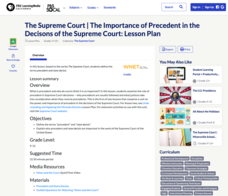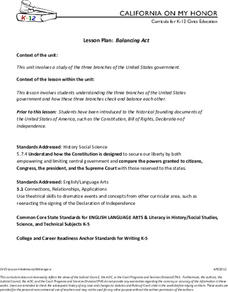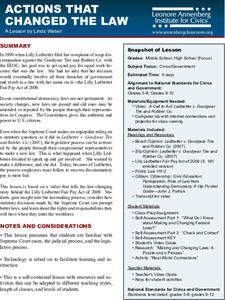PBS
The Supreme Court: The Importance of Precedent in the Decisions of the Supreme Court
People often hear the words precedent and Supreme Court together, but why? A resource on the Supreme Court includes a variety of discussion questions, handouts that guide young historians, a video about Nixon and the court system, and...
School Improvement in Maryland
Supreme Court Case Overview I
As part of a study of the 14th Amendment to the United States Constitution, class members examine four Supreme Court decisions—Gitlow v. New York, Mapp v. Ohio, Gideon v. Wainwright, and Griswold v. Connecticut—that incorporated the due...
Judicial Branch of California
Our Government Today…What A System!
A group of citizens in North Canada has decided to leave their country, and they are asking for help in setting up an American-style democracy. Using a carefully structured activity, pupils lay out the principles in the American...
Judicial Branch of California
Balancing Act: The Three Branches
What do hula hoops and the American system of government have in common? Using hands-on station activities, pupils consider the roles of the three branches of government. A script for teachers and writing prompts help round out a...
State Bar of Texas
Wisconsin v. Yoder
How far does freedom of religion truly go? The 1972 Supreme Court case Wisconsin v. Yoder introduces the concept of the free exercise clause of the First Amendment. Individuals examine the case with a short video and open discussion. To...
Ohio Center For Law-Related Education
Four Activities: Thurgood Marshall and the Nomination and Confirmation of Federal Judges
The process of nominating and confirming federal judges can sound like a lot of bureaucratic hoops, but a resource breaks down the steps of the Supreme Court nominations in a simpler manner. Learners participate in four activities that...
State Bar of Texas
Hernandez v. Texas
What if the jury is not made up of people from your ethnicity or background—are they still considered your peers? Scholars analyze the impact the Supreme Court case Hernandez v. Texas had on jury selection across the nation. Paired...
State Bar of Texas
Tinker v. Des Moines
Freedom of speech allows anyone, even those in school, to say and do what they feel—right? The 1969 Supreme Court case Tinker v. Des Moines serves as the backdrop for a study on First Amendment rights. Scholars use a short video along...
University of Arkansas
Human Rights
What basic rights are guaranteed to all Americans? Do citizens, legal aliens, illegal aliens, and minors all have the same rights? Should individuals all over the world enjoy the same rights? Class members read the Declaration of...
K20 LEARN
Allotment in Indian Territory: Land Openings in Indian Territory
To understand how the allotment policy embedded in the Dawes Act, passed by the U.S. government in 1887, affected the tribal sovereignty of Native Americans, young historians examine various maps and documents and Supreme Court cases...
Annenberg Foundation
Actions that Changed the Law
The Fair Play Act of 2009 came about due to the actions of one woman. Young historians research Lilly Ledbetter and what she went through to get pay equal to that paid to men for the same work at Goodyear Tire and Rubber Company. The...
Utah State Courts
Judges in the Classroom
Class members explore the process of a disposition hearing for juveniles, particularly looking at how the judge decides what sentence the juvenile offender should receive. Task your pupils with evaluating different sample cases provided...
My Access
“Banning Books” Lesson Plan
To Kill a Mockingbird, Hunger Games, Brave New World. Welcome to Banned Books Week. As part of a study of censorship and book banning, class members investigate censorship, the purposes of censorship, and First Amendment rights,...
Alabama Department of Archives and History
How Would You Feel? The Bravery of Civil Disobedience
As part of their study of the US Civil Rights Movement and the Montgomery bus boycott, class members read Dr. Martin Luther King's "Integrated Bus Suggestions." They then craft a short story about the first week of Montgomery bus...
Alabama Department of Archives and History
Alabama Slave Codes in 1833: What They Can Teach Us About Slaves Themselves
After viewing a short PowerPoint about Nat Turner's rebellion, class groups examine Alabama's 1833 slave codes. Individuals then develop a mini-legal brief arguing against one particular slave law.
















